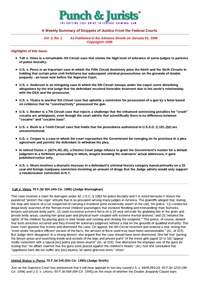This is a case that sent shock waves throughout the judicial system, and even had the President of the United States talking about impeaching a Federal Judge because he wrote a politically unpopular decision. To read the decision, it is difficult to understand the hullabaloo that erupted. Judge Baer …
Here the Court held that the assertion of an entrapment defense is "not necessarily incompatible with acceptance of responsibility" under U.S.S.G. § 3E1.1.
In this case, the defendant's PSI Report flatly stated that because the defendant had asserted the defense of entrapment, he was not entitled to a …
This decision affirms a conviction for "possession" of a gun by a felon under 18 U.S.C. § 922(g)(1) on the basis of "constructive" possession. The gun in question was found during a search of the home of the defendant's estranged wife. Nearly a year later the defendant was questioned …
Citing a 1992 D.C. Circuit case, the Second Circuit raises an interesting possibility for a downward departure motion on the basis that the sentence violates the Eighth Amendment. It notes that "unless the disproportionality between crime and punishment is so extreme that it violates the Eighth Amendment, . . …
This forfeiture case deals with the constitutional adequacy of the notice provisions contained in the Supplemental Rules for Certain Admiralty and Maritime Claims (Fed.R.Civ.P. App., Rule C(4)). Those Supplemental Rules require the Government to give notice of a proposed seizure only by publication. In this case, the claimants argue …
In this case the Court permitted the defendant to withdraw his guilty plea because the Government violated some of the terms of the plea agreement, including failing to recommend a term of probation as agreed. With unusually caustic language, the Court criticized A.U.S.A. Jenner for taking "with her left …
Case held that the "mailbox" rule adopted in Houston v. Lack, 487 U.S. 266 (1988) applied to actions filed by pro se prisoners under 42 U.S.C. § 1983.
Court held that assertion of entrapment defense is not necessarily incompatible with acceptance of responsibility.
Here Judge Baerrefused to recuse himself due to existence of circumstances under which his impartiality might reasonably be questioned, even though there had been extensive media coverage and political commentary following his original decision.
Here, over the strong objections of Judge Motz, police are granted qualified immunity in case involving brutal search of minors.
This case involves a claim for damages under 42 U.S.C. § 1983 for police brutality and it is noted because it shows the jaundiced "protect-the-cops" attitude that is …
This case involves a dramatic increase in a defendant's criminal history category based primarily on a 20 year-old foreign marijuana conviction involving an amount of drugs that the Judge admits would only support a misdemeanor conviction in N.Y.
This case gives new meaning to the word "ludicrous" and …
In the March 18, 1996 issue of P&J, we reported on Judge Baer’s initial controversial decision in this case (U.S. v. Bayless, 913 F.Supp. 232 (S.D.N.Y. 1996)), in which he granted a defense motion to suppress certain evidence because he concluded that the police did not have any reasonable …
This is an intriguing case that peremptorily rejects the hot-potato suggestion made by District Judge John McBryde that the defendant had received favorable treatment because his uncle worked with the DEA and with the AUSA in this case. The defendant pled guilty to a series of drug crimes and …
Case held that the procedures set forth in Application Note 5 to USSG § 1B1.2, which authorize the district court to determine the objects of a conspiracy in the case of a general verdict, violate both the 5th and 6th Amendments.
This drug case addresses the constitutional validity …
Case holds that when the Government's breach of a plea agreement is particulary egregious or intentional, the defendant should be allowed to withdraw his plea; and it rejected claims that the Government acted ethically based on new information.
In this case the Court permitted the defendant to withdraw …
The decision in this case adds another cogent argument to the growing arsenal of arguments that the "crack/cocaine" sentencing disparities are simply ill-conceived. [The case was decided on the basis of the 1990 version of the Guidelines, and therefore did not consider Guideline Amendment No. 487 which was adopted …
